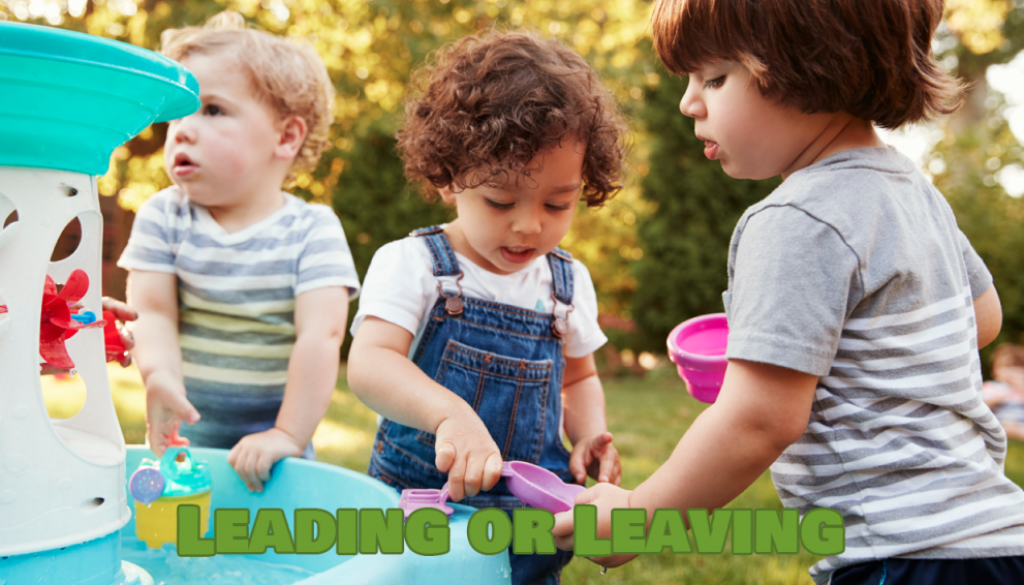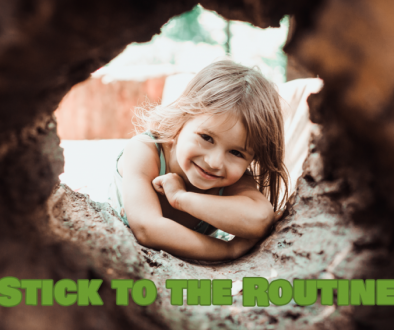Surviving Lockdown #2
Leading or Leaving
To watch the accompanying information video go here
A young child does not learn and develop through instruction, they learn and develop through experience and achieving the goal is not where the magic happens, it happens throughout the process.
The older the child the more they can play independently, and keep themselves occupied. However, no matter the age of a child, if they are stimulated and engaged, they are more likely to be happy to be left to their own devices.
You know your child better than anyone. Use their interests and imagination to make everything more interesting and appealing. Provide an engaging environment (please see this article).
Give your child space to try something new before helping them or telling them how to do it, unless it is unsafe to do so. Ask questions rather than instruct, allowing them to be involved in the process and have ownership of what they are doing, it will help them to problem-solve and use their brain more. Use discussion, redirection, positive reinforcement, and encouragement as guidance.
Movement and exploration is so valuable for young children. When they are playing, they are “working”. Play helps children to:
- Think creatively
- Develop problem-solving skills
- Develop language (though social interaction)
- Develop social skills
- Understand and learn about the world through real world experience
- Develop higher level thinking
- Develop Executive Function Skills and Self-Regulation
Get them Involved
Teach your child to take care of themselves and their home and to help others.
Teach them to help clean, prepare meals, sort shelves and take care of their own belongings and space.
You may need to show them a few times before they can do these tasks by themselves, but at some stage they will be able to do them independently.
Allowing children to partake in tasks that they may feel has value will not only teach them many skills it will give them a sense of self-satisfaction and they will come to see themselves as a valued member of their family / community.
When a child is cooking, playing role-play games such as shop keeper or sorting their toys, they are learning. They will be reading instructions, developing their fine motor skills, problem-solving, developing mathematic skills by measuring quantities or making things fit.
Movement to music and active songs are great not only for physical development but also for language development. Make your nursery rhymes active, creating large, energetic actions for each part of the rhyme and do them together.
Leading
When should you lead your child:
- To allow you to spend meaningful time with your child
- To introduce them to new things and experiences
- To teach them things that they may need help with (e.g. learning to skip)
- If a child seems frustrated with their task or activity, ask them a leading question to help them problem-solve and come up with a solution (i.e. what do you think you can do differently, what else can you try, do you think if you did it slightly differently it may work?)
- If your child is engaging in a sedentary activity for too long, ensure this is broken up with a more energetic activity that you either lead or that you know they will enjoy
- Set up an activity that piques your child’s interest and then leave them to continue without you. They can then use their imagination, interests, skills and abilities to take the activity where they choose
- Praise and challenges given by you will help develop your child further, however it is just as important to teach children to praise themselves, allowing them to identify their own achievements
- Once your child has learnt a new skill, revisit it as they will need repetition to develop it further. Repetition is important for young children and even when you think repeating an activity has become very boring, it is very likely that they are still enjoying the learning experience.
Leaving
If you have created a stimulating environment, your child should be able to spend a large part of their day engaging in activities of their choice independently. You should not need to constantly be thinking of activities and ways stimulate them.
When is it good to leave your child:
- Once your child is engaged in an activity, leave them for as long as they are happy, engaged and enjoying themselves
- Do not give them too many choices but give them a few things to choose from, allowing them to engage in a particular activity for as long as they like, or to move between a few, if they so choose
- If children are enjoying themselves they are most likely engaged. If children are engaged they are most likely learning and developing
- Ensure there is opportunity for role play, supporting the development of verbal skills and imagination. This can be through a role play area already set up or as an off-the-cuff role play game sparked by another activity, discussion or idea
Role-Modelling
- A child is just as likely to learn from what we do as from what we say. Be mindful of your actions as children are likely to pick up our good and bad habits.
- Children follow by example and positive active and healthy experiences with us will encourage them to be more active and healthy
- Teach children to use the same implements, tools and utensils as us from an early age. Allowing them to use real world tools that are used by adults instils a great sense of confidence.
- Instead of always doing everything for your child or teaching them to do things when they are told, show them how to self-motivate by giving them responsibility and praise when they do something without being asked. It is important to teach children to motivate themselves from an early age, rather than encourage them to always rely on being motivated by others.
- If you listen to your child’s thoughts, ideas and beliefs they are more likely to listen to yours
- Young children do not respond well to injustice, so don’t expect something from your child that you are not willing to do yourself, or that you do not demonstrate yourself
- Put your screen down and engage
- Be sure to give consistent messages and instructions. Reinforcing what you teach them by repetitions of behaviour or instruction will make it simple for them to understand what is expected of them.
Combining Child-led and Adult-led activities for children in the early years is important for their physical development, emotional, social and brain development and instils a sense of self-esteem and confidence that cannot be taught. It will ensure they will explore, discover, problem-solve and develop naturally and be guided by us to develop to the best of their potential.




